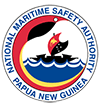Ship Safety - Papua New Guinea National Maritime Safety Authority

The Papua New Guinea (PNG) government is committed to the safety of life and property at sea and protection of the marine environment. As a member state of the International Maritime Organization (IMO) and a country engaged in international trade it is essential to encourage and facilitate the general adoption of the highest practicable standards in matters concerning maritime safety, efficiency of navigation and prevention and control of marine pollution from ships.
Through the National Maritime Safety Authority (NMSA), the PNG government implements and enforces a number of legislative requirements on the industry.
Flag State Inspections
A flag State, i.e., NMSA as the Maritime Administration is responsible for ensuring ships under National (PNG) flag to comply with national legislation and international conventions. Hence, NMSA maintain the responsibilities and obligations imposed by international conventions for ships flying the PNG flag.
Flag State inspections are conducted by Flag State Inspectors of the authority (NMSA) and the purpose of carrying inspections is to review the general condition of the ship, its operations and documentation to ensure that the minimum standards are maintained.
Flag state inspection is to verify, through an effective and coordinated system and other control measures, that ships comply with the requirements of the International conventions and implement the national laws and regulations. The inspection guide lines have been developed to assist flag States administrations to effectively implement their responsibilities with respect to the ship inspection and certification duties under the Maritime Labour Convention, 2006 (MLC ,2006).
Port State control
Port State Control (PSC) is the inspection of foreign ships in national (PNG) ports to verify that the condition of the ship and its equipment comply with the requirements of international regulations by IMO and that the ship is manned and operated in compliance with these rules.
This ensures that as many ships as possible are inspected but at the same time prevents ships being delayed by unnecessary inspections. The primary responsibility for ships standards rests with the flag State – but port State control provides a “safety net” to catch substandard ships.
Ten regional agreements on port State control – Memoranda of Understanding or MoUs – have been signed and Papua New Guinea is a member of the Tokyo MOU (link to site www.tokyo-mou.org).

